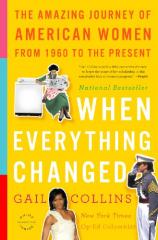When Everything Changed: The Amazing Journey of American Women From 1960 to the Present
Review
When Everything Changed: The Amazing Journey of American Women From 1960 to the Present
In 1960, a secretary named Lois Rabinowitz went to court to pay a traffic ticket for her boss. But there was just one problem: she was wearing pants. What is commonplace now (women in pants) caused an uproar at the time as the judge threw her out of his courtroom for dressing inappropriately. The event ushered in a new era for women, and the right to wear pants --- figuratively and literally --- was just the beginning. In WHEN EVERYTHING CHANGED, journalist and author Gail Collins chronicles 50 years of social, political, legal and cultural changes in the status, rights and roles of American women.
Rabinowitz never intended to be part of a movement, but there were many women in the 1960s who decided the time was right for change. Some of the first to demand if not equality than fair legal protection were flight attendants, who were sick of being hired based on looks and fired once they got married. In the years that followed, women’s rights to equal pay and fair treatment in the workplace and financial world became a massive movement led by all types of women: housewives, radicals, writers, politicians and artists.
Soon colleges began admitting more women. There were a growing number of female doctors, lawyers and elected officials. Yet even as they proved their competence, they continued to be discriminated against in various subtle --- and not so subtle --- ways. Women still felt the need to take to the streets and call for improvement. Of course, the backlash came, and it was often led by women as well.
One of the most interesting and poignant sections in the book is Collins’s examination of the Civil Rights Movement from the perspective of women’s participation and contributions. There is great irony that an equality movement would discriminate based on gender. Collins spends much of her time discussing women in law, politics and journalism, and there is little mention of women in cultural milieus such as art and music. Still, the book doesn’t seem lacking, only thusly focused.
Collins’s narrative is a blend of well-researched history and interviews; she covers all the heavy-hitters of the movement but spends plenty of time discussing the changes brought about by women most have never heard of. In this way, the scope is broad and informative, but the book is personal and energetic. Though entertaining and readable, it packs a punch. Young ladies may not realize, for instance, that until after 1970 women couldn’t sign for mortgages or credit cards in their own names --- and that realization is powerful. A lot has been accomplished in the last 60 years, and this book celebrates that but also acknowledges that true equality has yet to be achieved.
WHEN EVERYTHING CHANGED is the follow-up to AMERICA’S WOMEN but can be read alone as an exploration of contemporary women’s history in America. Ending with an even-handed account of the 2009 presidential election and the key figures of Clinton, Palin and Michelle Obama, Collins succeeds in bringing the book to a timely and exciting conclusion. With a balanced but pro-equality message and a lively style, she treats her subject with all the seriousness it warrants and the right amount of humor to keep the reading from being dull. WHEN EVERYTHING CHANGED is a welcome and important addition to the study of not just women’s history but American history.
Reviewed by Sarah Rachel Egelman on April 27, 2011
When Everything Changed: The Amazing Journey of American Women From 1960 to the Present
- Publication Date: October 21, 2010
- Genres: History, Nonfiction
- Paperback: 512 pages
- Publisher: Back Bay Books
- ISBN-10: 0316014044
- ISBN-13: 9780316014045





